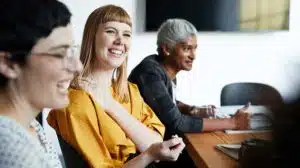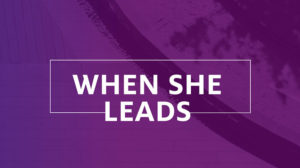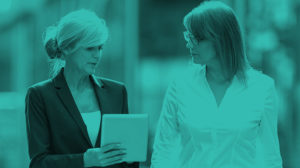- PODCAST
When She Leads: Teaching Teens to Code, and Beyond
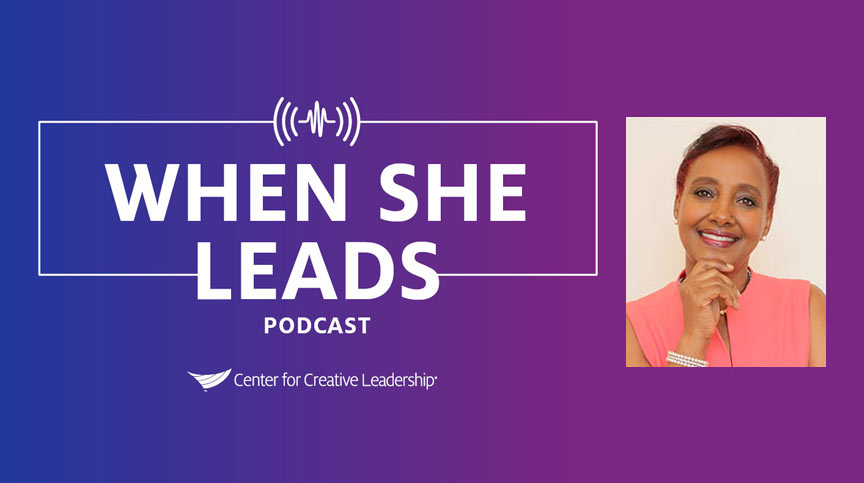
In this episode of When She Leads, our women in business podcast, we speak with Tsegga Medhin, who describes herself as an “equity accelerator” and champion for women. She explains what drives her and how she’s working to build confidence and courage among girls and young women through youth leadership development, including a partnership with Apple to teach teenage girls to code. She and host Laura Santana discuss encouraging girls to explore STEM and the importance of coaching, sponsorship, fighting unconscious bias, and self-awareness. Listen now or read the full transcript, below.
Listen to the Podcast
In this episode of When She Leads, Tsegga Medhin discusses how leadership development can help build confidence among young women. Listen now.
“If a girl sees another girl doing it, definitely she will be confident. If she also comes in at a platform where the boys and girls are doing the same kind of work, that’s going to be powerful.”
Tsegga Medhin
Founder & President
The Pearl Leadership Institute
Interview Transcript
INTRO:
Welcome to When She Leads, a podcast from the Center for Creative Leadership that showcases the power of women in the workplace. We’re sharing stories of inspiration and impact from executives in a range of industries and organizations around the world. These are people who are making a difference by supporting women’s advancement and development…Because we believe when she leads, it’s ultimately about better outcomes for all.
HOST, Laura Santana:
This is Laura Santana, global faculty at the Center for Creative Leadership. Today I’m delighted to speak with Tsegga Medhin. She’s the founder and president of the Pearl Leadership Institute, as well as the president of UN US Women, North Carolina. Tsegga is an equity accelerator and moving women’s role forward, faster.
So Tsegga, thank you, for being willing to come to this conversation. Can you tell us a little bit about what your organization does and what it’s about?
GUEST, Tsegga Medhin:
Sure, thank you. Thank you again for inviting me to this forum I’m glad to share my story and my perspective.
So, as an advocate for women’s empowerment, I continue to stand in inquiry, seeking answers for my why. Why am I doing what I’m doing? Why am I passionate about this? And why do I do this? Because I believe in women’s role as builders of economic prosperity, peace for people and planet through the strong partnership that we’ve created.
Laura:
That’s wonderful to think of women as builders of economic prosperity. Can you share with us maybe an example of what that looks like?
Tsegga:
Okay. I’d like to give a bit of a background as to why this happened for me. Of course, having worked for a technology company and also in the financial sector for quite a few years, it really gave me a choice to say that, “I’m equipped now and I can really help women empower themselves and also continue on becoming the economic drivers of nations, communities, and ultimately the globe.”
And I say that because I’m not sure exactly how many of our listeners have read the information that came out from McKinsey Global Insight. It said, we could add $12 trillion to the global growth by 2025. 12 trillion is a lot of money, and it’s a lot of economic empowerment. And I do know that if we even have a smaller percentage of that, in our own communities, I think we’ll be able to really bring that growth to many. We will change the trajectory of our lives, we will also change our narrative, and we will own our narrative.
The business case for women empowerment, for me, it is not only the right thing to do, but it’s also the economic thing to do. That’s why I’m really engaged in this kind of conversation, and it really attracts the purpose of my living.
Laura:
Thank you. And as you connect the business case to women, can you share with us a little bit about your story? And your role in your organization?
Tsegga:
I have a diverse background, again in experiencing America both in the technology and the financial sector. I left IBM about 4 years ago after about 2 decades of work. And as I see my work shape towards women’s empowerment, it is also because I’m finding that that’s a purpose for living. I can live a purposeful life by being a capacity building consultant. That I could impact women and girls through STEM, for example.
STEM standing for Science, Technology, Engineering and Math. So that combination is bringing us to the table where we talk about science, technology, engineering and math, to really become a catalyst for women. To really make that change that is needed economically and then going to the level that we have not seen before.
So in 2008, I was selected as one of the first 100 IBM Top Talent Corporate Social Responsibility Program. And the intent at the time was obviously to impact the emerging markets footprint for the company. But at the same time, there was also the need for skills development, so we were sent for consulting pro bono work in Africa, Tanzania. And I decided then when I came back, that I needed to create something that is bigger than me.
What I saw when I went to Africa, was that, “I am equipped and I can change the narrative for many.” And so that’s when I created the Pearl Leadership Institute, and made it a nonprofit organization because women have always been overlooked. And so I’m thinking, maybe we should have this essence of saying, “I’m here, and I see you.”
And so when we look at these opportunities we’re going to see women as visible humans in the room.
Laura:
That’s a very compelling view on your time in Africa and the call to change and inform, or at least guide the narrative, as women have been overlooked, and now you’re helping them to visibility. What are the challenges that you’re trying to help evolve the narrative around?
Tsegga:
I like to think about the success that we’ve had in our organization. But I also want to talk about the challenges because I think one of the largest challenges that every organization today has is access to capital and resources or talent, especially in the nonprofit business as well as any other business.
So, talent is the largest component of continuum for any company, any localization. I’m finding the attraction and retention, and also developing of talent is one of the most important ones that we need to be tackling. And so our work is centered around, “how do we better understand and center equity in our leadership and activate our own learning?”
And in these times of VUCA, volatility, uncertainty, complexity and ambiguity, things are really crazy and disrupted. There’s a new normal. And for that we need to be agile and persistent on our mission . So becoming strategic, not tactical. How do we attract and retain and advance women? It’s going to be an imperative for us as a nonprofit as well as any business in the world.
Laura:
Tsegga, I would love to ask if you could share maybe a story about what it looks like, as we talk about your focus on getting access to talent in a very disruptive world, helping people think strategically, not only tactically. Can you tell us a story of a woman’s journey that you guided along the way and helped her be more strategic?
Tsegga:
Okay, thank you. That’s a perfect question! I think the most important one that comes to mind is this relationship that I’ve had with a girl by the name of Bethel for example.
She’s a sales marketing leader now at IBM. When I met Bethel, and her parents, she was only in sixth or seventh grade. She was a middle school young lady. So the thing that I was doing at the time was STEM outreach. So we brought her into one of our outreach programs at NC State, we collaborate with NC State. And then this young woman kept on moving forward. Obviously, her parents were also engaged parents. That’s another equation to the partnership.
And what I noticed is that this young lady also wanted to be somebody, to become somebody. Right before college was over I made sure that I sponsored her for a program that we had at IBM to become a sales intern. She went to Boston, she stayed there, and then a year later because of her performance obviously, IBM wanted her to be one of their sales people.
Now, fast forward 3 years. I’m seeing her really thriving and really doing a great job with this technology company and doing what she wants to do. Making herself proud, having the self-awareness that is needed, making sure that she’s economically strong for herself, her family and her community.
And so these are the stories that our role is to make sure that we’re really changing one woman at a time, one community at a time, one family at a time. So that that kind of change-maker opportunity becomes available for us as well as for them.
Laura:
It sounds like there’s a role of coaching, of sponsoring, and a very large amount of self-awareness. Tell us are you personally involved? In every step of the way you also coach and you sponsor, it sounds like.
Tsegga:
Yes, I do. And the only reason I do that is because I’m seeing the impact that it has on this positive engagement with youth, especially. Youth being our next generation of emerging leaders, youth being the ones that we need to be really listening into. One of the reasons I do this is because I think it’s important for us to have that intergenerational relationship.
I’d say that access to a coach or a sponsor is very important. Mentors, we can have mentors across our lives. Obviously, we can live without a mentor, but we could not live without a sponsor. The reason that I’m able to touch these women’s lives is that I am seriously engaged in their success. Because I know what it means for them to be somebody, that they will be really happy about themselves and really continue that life and the trajectory and owning their own narrative as well. It is quite important to me.
Laura:
And what would be a typical length of you being a mentor or a sponsor? How long do you usually stay engaged with people as you get them to own and evolve their own narrative?
Tsegga:
Well, I stay involved as long as they need me, as long as it’s necessary, as long as they have that need for me. There’s something I always say, when I was working in IBM in my leadership position, and I promoted somebody, I always told them, “Don’t forget to set the elevator down. That’s critical.”
“Let me lift you up. Let me take you up. Let’s take this elevator stairs together.” That’s the kind of thing that I want them to do.
So I stay with them as long as they need me. And I also stay connected because there’s always a chance for them to say, “Hey, I’m doing this, what do you think? How could we do it?” So that’s the kind of relationship that I’ve had with many women both in the industry as well as youth and emerging leaders that I have worked with.
Laura:
So it sounds very exciting, like the people that you have worked with, then you would be looking for ways to encourage them to pay it forward with women who are coming behind them, in your elevator example. What are some of the things that you encourage these young women to do?
Tsegga:
Okay. So what I’d like them to do is obviously understand that to close the gap, we need action on all fronts. From being advocates, to the issues that they stand for, to holding on to their competitive advantage because it’s the secret sauce to their success. To exploring possibilities, to continually believing in themselves, to make definite decisions, and also take risks, to continue on investing in themselves. And another thing is become a person of interest. Who is it that you want to be? Who do you want other people to be? How can they be part of your success? How do you really bring them over to your camp if you’re running for something? If you’re running for office or having an opportunity to say, “I’m doing this project, how can you help me? Or can you be on my board?”
So adding some kind of texture to their lives, because that’s important. And also making sure that their competitive advantage is also their EQ. Emotional intelligence is very important. How do they say what they want to say? Do you need to be on the streets to just say, “Rah, rah rah?” Or do you need to be in the place where people are making decisions, policy changes, advocacy issues? Because at the end of the day, I think this equity and gap of women’s issues is not going to be only about us. Many women like us are really working towards representing ourselves in different meetings. But also it’s important to be representative in places where there is policy change. So those are the kinds of things that I want our women or our girls and men, by the way, I’m not excluding men from this because I think we are the 50%. So I need them to be part of this journey to really bring about that change that is needed, because we need to value each other. You can’t undervalue the other 50% and then continue on being successful.
Laura:
I think that’s very well said because we are wanting a more inclusive and equitable narrative. I think a lot of people are.
Are there tips that you pass to them on how to have those conversations?
Tsegga:
Yes. And the reason we do that is obviously because I think, how do we talk to ourselves? It’s great self-talk, self-belief, self-love, rather than getting caught up in the battle of genders.
And so, part of the work that I’m doing with our women or men is to be assertive, to be present, to set some healthy boundaries, to seek out some situation that make them uncomfortable because I think when you’re uncomfortable, that’s where innovation comes in. That’s when courage comes in. And that’s why we need the courage and the confidence of women that are doing what they’re supposed to be doing. All the many women that came before us did what they did, because they had enough courage and enough confidence that was created by all the work and all the kind of relationships that they’ve had with their circle of friends or circle of influence. And so, that’s the work that I asked them to do.
And getting them to also be at a level where they are going to be breaking the unconscious biases that are formed quite early. For example, one of the things that we do is we partner with Apple here in North Carolina, at one of their stores. For Women’s History Month for example, we have 25 girls that are from marginalized communities to come in and do an hour of coding with Apple. And then another one that is boys and girls of the same age between age eight to 13, to come in and do the work that happened the 2 weeks before. And I do that because I want them to make sure that we’re going to be breaking the unconscious biases that are formed early.
If a boy or a girl sees that, if a girl sees another girl doing it, definitely she will be more confident. If she also comes in at a platform where the boys and girls are doing the same kind of work, then as early as eight and 13 years old, that’s going to be powerful for them to say, “Okay, that was easy. I can do it. I’ve got the confidence.” Those are the kinds of elemental assertive ways for them to create a better world for themselves and others.
Laura:
What I appreciate about that example, Tsegga is the intergenerational of it. The narrative changes as we learn to ask better questions, we have role models, we see people who look like me doing the work and it opens many doors of possibility, doesn’t it?
Tsegga:
Yes, yes. Yes.
Laura:
You have talked about the role of your organization. It sounds like you engage in partnerships, NC State and Apple. Sounds like you are involved in coaching as well. Can you share some of the positive impacts that you, that Pearl Leadership Institute has actually seen from some of the engagements?
Tsegga:
I do believe in partnership, especially private public partnership, because that’s where the essence of action happens. And so opening ourselves to that is quite critical for our success and that of our young people.
So working with the Center for Creative Leadership, working with Apple, working with NC State, working with Duke University. We’re hosting 100 girls from the Girl Scouts group to make sure that it’s a day of exploring and also inviting girls to really find out, “What’s your potential? Where could you go with this?” It’s obviously an initial conversation that happens and hopefully it will go on beyond that.
Recently, just last weekend, I had my first advocacy for girls from high school. 17 girls came in on a Sunday afternoon and we had this huge participation by girls that age. And I was so amazed at how awakened these girls are.
And when we do these sessions, I tell them, “Don’t wait for permission. Don’t ask anybody. Just do what you need to do.” You know, in the book of CCL, Kick Some Glass by Portia and Jennifer, I’m seeing when women are overlooked and undervalued, it happens because we’ve not done what we’re supposed to be doing when we were young.
Laura:
That is a fabulous statement of how we can support each other. It sounds like you’ve had some impact on many lives, Tsegga. What is the impact on you personally?
Tsegga:
Thank you for asking that question. So I do believe that I do what I do because it is really energizing my soul. Every day I wake up, I feel so blessed and really participating in the space of change. So, I not only feel like I’m an accelerator of equity, but I also call myself a perception shifter. And for that I mean, shifting our thinking doesn’t happen overnight. And so for me, it’s going to continue on being a journey of learning and also doing.
I have learned to also unlearn the habits that were holding me back. I focus on my strengths more so than my weaknesses. Often they say, “What are your weaknesses? And what are your strengths?” I do like to talk more about strengths, not because I don’t believe in improvement, of course, but because I want me and the people that I work with, both men and women, to be confident and continue to build their confidence by focusing on their strengths. Because I think leadership, as you know, is about summoning our courage to show up confident, to become influential.
And now, My days are filled with gratitude because I’m seeing that I have changed, and for that I help change others.
Laura:
Filled with gratitude is quite an impact on your life as you help others and help us all evolve the narrative.
Tsegga:
Yeah, thank you.
Laura:
Who do you look to for inspiration or for guidance? I’m wondering if you had a role model, or how that happened?
Tsegga:
I do, I do actually. I think we all have role models, obviously. And we all learn from somebody. For me, my number one influencer in my life has always been my mom and dad. Both great people with integrity, that they always taught myself and my siblings to be focused. That education is important, and also to be kind to others and yourself. Those were the 3 most important thing that they always told us.
I also learned a lot by great leaders that I’ve either met or even read their books. Like I listened to Nelson Mandela, Maya Angelou. And one thing that was made clear for me is that even those who lead the way, they don’t have all the answers. And we all need help along the way. So I’m listening to people, I’m following people. And thanks to the internet we have access to so many webcasts and webinars that I follow. Many of your webinars that are presented by CCL. And I also listen to many people that really energized me every day because I need that. I need that so that I could also share it with others.
Laura:
It sounds like you draw from many sources of inspiration. You’ve mentioned books and podcasts. Do you have 2 or 3 recommendations that you think our listeners might be particularly interested in?
Tsegga:
Okay, yes, I do actually. I like the book Kick Some Glass by Jennifer Martineau and Portia Mount. I like that one. It’s very, very good. And the many other books that I have. My favorite one when I was working at IBM, I remember it was For Your Improvement–FYI. That’s my favorite book, I keep on checking on it frequently. There’s another book that I like is called Chosen Seed by Denise Bennett. And another person that I’ve been following her TED Talks and all these, Carla Harris, Expect to Win. Those are the 3 books that I have been really referring to. And I’m also finding that when you read books, they seem to open a lot of avenues and opportunities for myself. And I’m also sharing this with the people that I work with the coaching and bringing them to that space and letting them know how important it is to have access to this resource.
Laura:
Thank you. I’m wondering, if you had advice for your younger self, what pieces of advice would you offer your younger self?
Tsegga:
Okay, that’s a good question.
I would say, “Tsegga, why are you waiting? Don’t wait for any permission. Don’t wait to be chosen. Avoid being overlooked and undervalued. And it’s okay to mess up. And most of all, don’t sweat the small stuff because it’s all small stuff.” That would be one of my biggest things.
And the last one that I would say, “You are enough. You don’t need to do other things.” So my enoughness and being enough is quite important for me, I think sometimes in the life that we’re leading occupied by so many things, we tend to really address the issue of not being enough. But we are enough. Fill the days with gratitude, and summon your faith that is taking you on every day.
Laura:
Tsegga, I want to acknowledge your time and the willingness to sit down and have this conversation with us. I am sure that your words will touch listeners, and hopefully inform the paths of young women and mid-career women, and just keep the conversation alive and keep our narrative evolving.
Thank you so much.
Tsegga:
Thank you, it was a pleasure, and I appreciate you as well. All the best to you and your loved ones.
Guest featured in this episode of When She Leads:
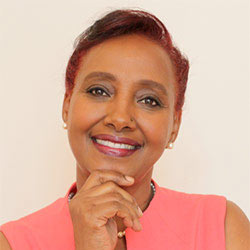
Tsegga Medhin is president of the North Carolina chapter of United Nations Women USA and founder of the Pearl Leadership Institute. Drawing on her experience of leading IBM’s flagship Corporate Social Responsibility and Citizenship Program, her global consulting business harnesses her multicultural foundational competencies to deliver business solutions that reflect the marketplace. Tsegga is a Computer Science graduate of National College, and has studied Executive Leadership at the University of North Carolina at Chapel Hill and the UCLA Anderson School of Management.
Host of this episode of When She Leads:
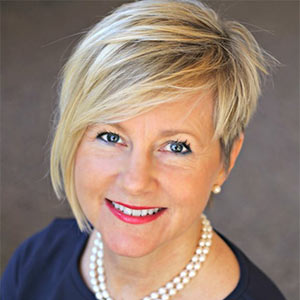
Laura Santana is a former Senior Leadership Solutions Partner at CCL, working across sectors with global clients to address the challenges created by disruption and globalization. She designs customized solutions for leadership development, with impact beyond the classroom. As a consultant, speaker and author, Laura’s focus is on vertical development, cultural agility, globalization and addressing the challenges facing women leaders.
| Related Solutions
Sign Up for Newsletters
Don’t miss a single insight! Get our latest cutting-edge, research-based leadership content sent directly to your inbox.
